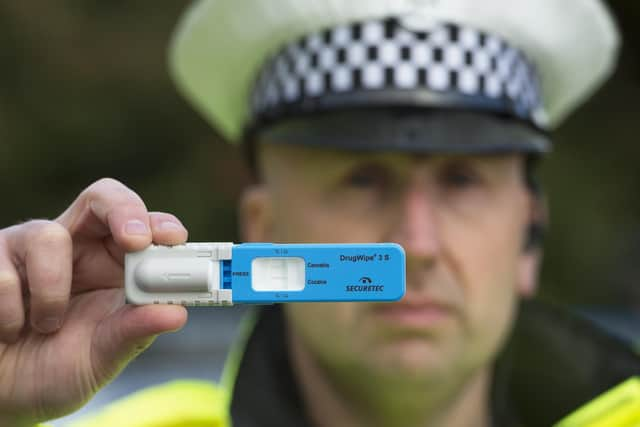As many drug drivers as drink drivers caught by Scotland’s traffic police thanks to new test kits
and live on Freeview channel 276
Up to 50 motorists a week are being found to have taken the drugs, which has exceeded expectations, Police Scotland told Scotland on Sunday.
The force revealed that its first specific drug driving campaign last month saw 42 of the 109 drivers tested during the week-long crackdown being arrested.
Advertisement
Hide AdAdvertisement
Hide AdIt comes nearly two years after roadside drug wipes were introduced in Scotland to detect levels of the drugs in the body.


Officers previously had to prove drivers who had taken drugs were impaired, such as by asking them to walk along a line or touch their nose.
Police Scotland said its road policing officers – the only ones to conduct the tests – were detecting drug drivers as often as motorists over the drink-drive limit.
Superintendent Simon Bradshaw, its deputy head of road policing, said: "Having now the opportunity to use a similar test for drugs, we are clearly getting similar numbers as we do for drink drivers.”
Advertisement
Hide AdAdvertisement
Hide AdHowever, he said the overall number of drink drivers detected was higher because local police conducted breath tests but not drug tests.
He said: “We feel it’s been a success in that we have carried out around 10,000 roadside [drug] tests and a good proportion of those have resulted in drivers being arrested.”
Supt Bradshaw said an average of 40-50 drug drivers a week were being arrested, which he described as “quite sizeable numbers”.
He said: "The numbers that we have caught has exceeded our estimations, based on the experience of England and Wales who brought in the legislation a few years before us.
Advertisement
Hide AdAdvertisement
Hide Ad"It was a bit unwieldy trying to prove impairment – we didn’t really know what the extent of drug driving was in Scotland, so we estimated the numbers we might catch based on what had happened in England and Wales.
"But it was clear to us with the numbers we were catching it was a larger problem than we had originally estimated.
"That proved to us the legislation has been really worthwhile, and as a means of getting offenders arrested and ultimately disqualified and off the road, it’s all positive.”
Supt Bradshaw said technology was being developed to test for the 15 other drugs covered by the new law, including heroin.
Advertisement
Hide AdAdvertisement
Hide AdThe current tests are limited to cannabis and cocaine, as the most popular recreational drugs.
Motoring group IAM RoadSmart called for police patrols to be stepped up.
Neil Greig, its Scottish-based policy and research director, said: “It has taken Scotland a few years to catch up with down south, but it’s really good news for road safety to hear that drug drivers are now being caught in such high numbers.
"Now that Police Scotland has a better idea of the scale of the problem, it is imperative they push even more resources into high-profile traffic policing to catch drivers who are a hazard to themselves as well as to other innocent road users.
Advertisement
Hide AdAdvertisement
Hide Ad"A wide range of drugs can impair your driving, so more work is needed to bring on board new detectors and tests that can catch those affected by substances that can’t currently be detected at the roadside.”
